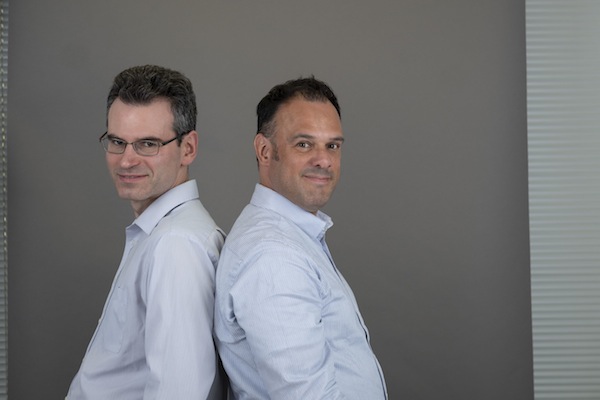Help Each Other Today’s Ilya Goldman, left, and Carlos Taylhardat. (photo from Help Each Other Today)
Ilya Goldman and Carlos Taylhardat have created Help Each Other Today, a messaging platform that connects people who need help with those who want to help.
Goldman, a computer programmer and software engineer, was born in the former Soviet Union and made his way to Israel in 1990. He and his family moved to Vancouver in 1994.
“Eventually, I started my own marketing company (internet-exposure.com) in 2001,” said Goldman. “Recently, because of COVID-19, business did slow down, basically because not as many clients are working right now – a lot of my clients were local businesses.”
In light of the new situation, one of Goldman’s clients, Carlos Taylhardat of artofheadshots.com, started creating coronaSOS.com. While putting the site together, Taylhardat contacted Goldman and Goldman saw in it the potential to help many more people. So, together, they created helpeachothertoday.com.
“I wanted to move beyond just helping people during the coronavirus,” said Goldman. “I wanted to make it available for people when they need help, even after the pandemic is over. Also, I wanted to automate how people are being matched.”
People wanting help and people offering help first need to sign up for to the service, which they can do at no cost. Then, they can post an offer of or request for help that falls within the site’s categories of Delivery, Financial Support, Peer Emotional Support, or Any.
When posting, people need to submit a location, as the platform matches helpers and people needing help based on location, with people able to access posts in their area.
“Helpers will see help requests in their area and can decide if they want to help that particular person,” said Goldman. “Once they decide to help, they essentially offer this help, and they can chat on the website and arrange how.”
Taylhardat and Goldman have been volunteering their time and resources to help people during the pandemic. They considered incorporating ads into the platform, but decided not to, as they felt it would distract from the core concept of the website.
While no one monitors conversations, if ever an abuse of the system comes up, Goldman will step in and block users as needed. So far, no abuse has been reported.
Requests have ranged from a need for groceries or diapers to help with the cost of a wheelchair or in finding public housing.

“Unfortunately, not all help requests can be answered,” said Goldman. “And, unfortunately, not every place has helpers available to help with every request. That’s why we’re trying to get more attention to the website, so all people who need help can register there … and, also, so people who can help can be there for those in need.”
Right now, help and helper posts are only shared within a city, but Goldman is working on a system that will let users choose a post radius.
“Currently, I think we’re helping in 1,091 cities around the world,” he said. “As we move further, we probably will be doing it one country at a time – starting with the U.S. and Canada, and then expanding it further.”
A recent Help Each Other Today media release noted, “The COVID-19 pandemic has made huge changes in all our lives and, often, those who were most vulnerable at the onset were also disproportionally affected by the virus – both by the disease itself and by its huge economic impact. On the other hand, this crisis also shows the great willingness of people to help each other, as many people donate their time and money to help those in need.”
“Social distancing is not social indifference,” Goldman told the Independent. “So, spread the word, post it on your social media, and help more people help each other.”
For more information, visit helpeachothertoday.com.
Rebeca Kuropatwa is a Winnipeg freelance writer.

